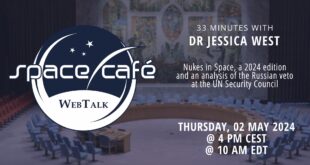
Ibadan, 29 May 2023. – Arabsat has launched its Airbus-built Badr-8 telecommunications satellite from Cape Canaveral, Florida. Based on Airbus’ latest geostationary Eurostar Neo satellite, Badr-8 will provide connectivity for users across Europe, the Middle East, Africa, and Central Asia.
The spacecraft features Airbus’ space demonstrator TELEO to provide space to ground optical communications at gigabit speeds. The TELEO demonstrator payload will facilitate very high-capacity optical feeder link communications, playing a crucial role in Airbus’ development of a new generation of optical communications technology in space.
Jean Marc Nasr, Head of Space Systems, said: “Marking our third successful launch of the Eurostar Neo series and our eighth spacecraft built for Arabsat, Badr-8, with the very innovative TELEO payload, is the latest major milestone for our telecoms business. Featuring increased payload capacity and more efficient power and thermal control systems, Badr-8 will replace and increase Arabsat’s capacity.”
Following the successful launch and separation, Badr-8 is using its electric propulsion system to reach geostationary orbit at 36,000 km. After that, the satellite will undergo a comprehensive testing period in geostationary orbit before entering full service. With a launch mass of 4.5 tons and 17.8 kW of power, the satellite is designed to operate in orbit for 15 years. Airbus’ geostationary telecommunications satellites have achieved more than 1,300 years of service in orbit.
Airbus developed its Eurostar Neo platform in the frame of the European Space Agency’s (ESA) Partnership Projects, together with the French space agency CNES. Furthermore, the UK Space Agency and other European agencies strongly supported the satellite platform.





